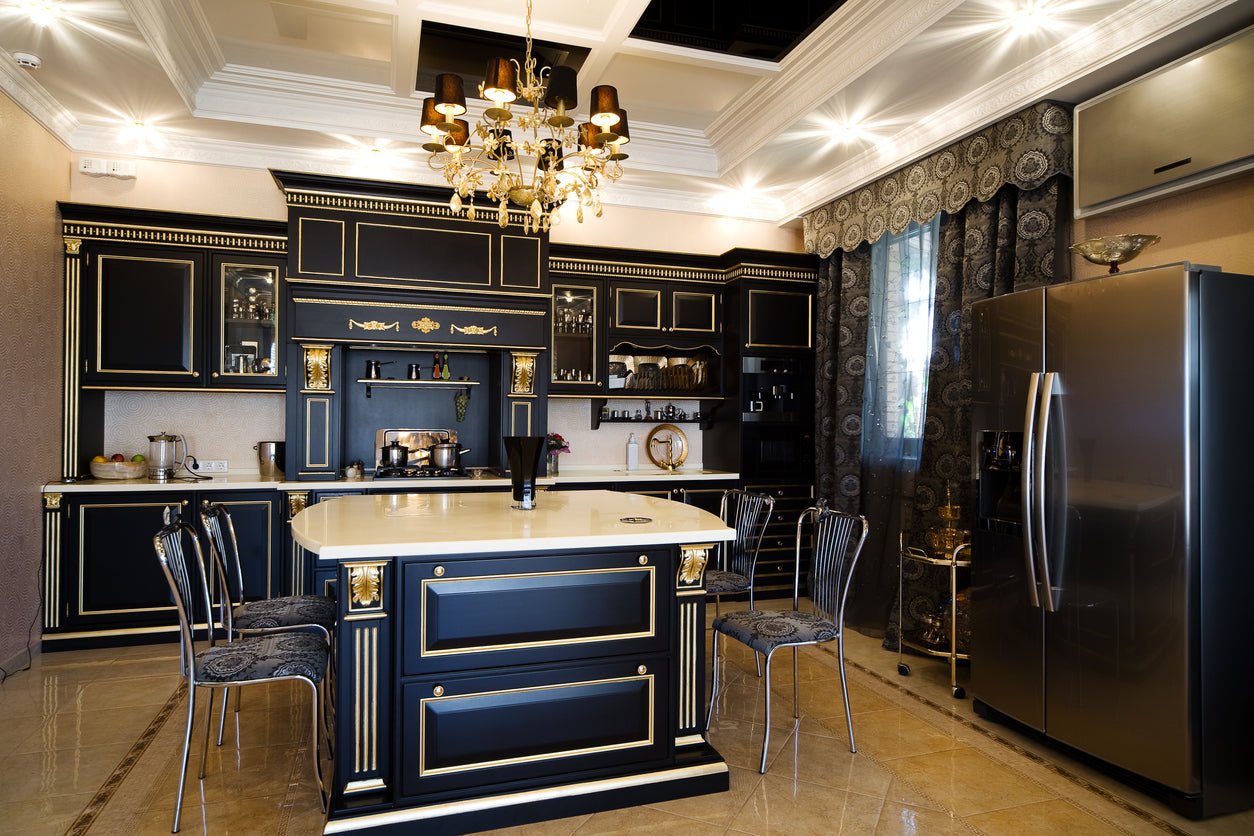My Cart
Your Cart is Currently Empty
Hassle FREE Shipping And Returns

The kitchen is known as the heart of the home, and a Gothic kitchen is the perfect place to entertain dinner guests and create treasured memories. However, with this aesthetic, it is important to avoid a gloomy and cluttered feel. Here are 17 of the most important tips to ensure you create a refined Gothic Kitchen.
Consistency and minimalism are just as important as which colors you choose. If you introduce too many into your kitchen, the overall effect will be chaotic and cluttered. Black should always be the defining color, and then you should select just one secondary color. Accents of dark rich wine colors, luxurious golds, metallic silvers, emerald greens and bold whites are popular choices, combining depth and vibrancy.
Gothic style is highly versatile, with an array of aesthetics to choose from. Just as with color, consistency is key. Research the different types, from contemporary minimalist styles boasting marble kitchen islands to vintage Gothic kitchens that showcase repurposed stained-glass artwork, to find the style that is right for you.
The main furniture in your kitchen should be both useful and beautiful. A great example would be the eye-catching Cherry Wood Dining Table by FIBean. It features elegant decorative carvings and luxuriously upholstered matching dining chairs.

Stunning lighting is an integral element of any Gothic kitchen. Low-hanging grand chandeliers and tables adorned with stately candleholders are a beloved feature of this style. You may like to place high-quality LED imitation tealights in alcoves beneath artwork to recreate a sense of flickering flames, but without the fire risk of centuries past.

Sourcing vintage and antique items from thrift shops and yard sales is a budget-friendly way to bring both integrity and opulence into your Gothic kitchen with uncommon pieces that reflect your personality.
Rather than ripping your kitchen out, it is usually more time and cost-efficient to adapt your existing kitchen. Light wood can be stained darker, intricately decorated mouldings can be added, and surfaces can be repainted.
Items that usually belong in the yard, such as small stone gargoyles, can be brought in to create a sense of grandeur. Peeping from the tops of cabinets, they give a subtle nod to the Gothic architecture of European cathedrals.
In this interior style, fabrics are not limited to just the floor. Consider hanging tapestries from the wall to create a brilliant talking point. Popular designs include mandalas, damask flowers and hunting scenes.
Nothing spoils the overall effect of a Gothic kitchen more than mundane tableware. Think of your tableware as the clothes that dress your table.
Antique, vintage and artistically crafted accessories create the suggestion of priceless heirloom pieces. Items such as this Mouth-Blown Crystal Punchbowl should be placed in the very center of your table.

If you plan on hanging an array of artwork on your walls, the smooth texture of paint is ideal. It is also worth considering making the walls a focal feature themselves, with either a decadent patterned wallpaper or rich wooden paneling.
A well-placed artisanal rug provides a brilliant contrast with an exposed hardwood floor, putting one in the mindset of Gothic manors past.
Accentuate any exposed wooden features in your home, such as beams or shelving. These can easily be darkened if necessary.
Mirrors have many purposes in interior design. They reflect light and can be beautiful pieces of art in their own right. They are ideally placed opposite the dining table.
Pieces such as vintage birdcages can be effortlessly spray-painted black and repurposed to hold candles or cookbooks.
Gothic style is characterized by that "wow" factor, so it is important for your Gothic kitchen to boast at least one stunning talking point, whether that is a dazzling chandelier, an ornately carved dining table, or a collection of miniature stone gargoyles.
Never underestimate those little finishing touches that are vital for truly refined style. The delicate flourishes of simple plaster molds can really enhance the Gothic style of your kitchen.